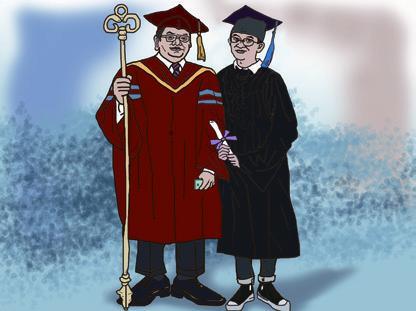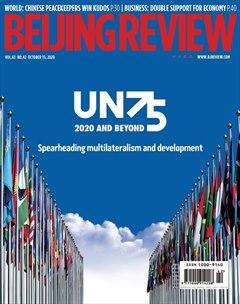Should Tutors Have Discretion Over Students’Graduation?

Recently, the Ministry of Education(MOE) responded to a proposal put forward by a member of the National Peoples Congress that tutors of graduate students and doctoral students should be given decision-making power over whether the students should be allowed to graduate. MOE plans to fully adopt this idea and will issue details later this year on tutors rights and obligations.
This news has taken academic circles in China by storm. Some applaud the new policy, believing it will help tutors play a more effective role in nurturing their pupils. Also, they can deny graduation to students who are not qualified until they meet the necessary standards. Meanwhile, others have expressed concerns that tutors might abuse their power as they already have huge discretion and a big say on students graduation. The worry is that if tutors are given the absolute right to decide whether or not a student can graduate, the process will be totally dependent on their moral code and professionalism, without input or oversight from universities or other academics, putting graduate students at a disadvantage.
Excessive power of tutors
Wang Tianding (The Beijing News): Stories about tutors and their students have become a trending topic within the Chinese academic community, and also among the general public in recent years, with frequent negative reports. For example, some graduate students became depressed due to their inability to graduate, eventually leading to suicide. Some of these students were used as free labor in their tutors private businesses.
While these terrible outcomes were brought about by a number of contributing factors, the most striking is misbehavior by tutors, with extreme cases sparking public indignation. These cases point to one question: Are there any restrictions on tutors rights?
Graduate students tend to be at a disadvantage in almost all cases, particularly within science and engineering disciplines, due to the high cost of the research they undertake at the postgraduate level. Some graduate students refer to their tutors as their bosses. This is not said jokingly, but is a helpless reality. Worse still, some tutors enjoy being the boss. They make their students do work unrelated to their academic development, such as housework and accounting. Some tutors have their own off-campus businesses in the name of combining scientifi c research, study and production, where graduate students are used as cheap labor.
Students refrain from complaining even in extreme circumstances. This is already quite common among graduate students.
In these circumstances, without proper checks and balances an expansion of tutors current powers is likely to make fair graduation more difficult for postgraduate students. The kind of discretion being granted to tutors is not based on a set of established and standardized rules, but rather depends on tutors personal moral code and professionalism.
Tutors do need some independent decision-making power on whether a student should graduate, but there must also be relevant mechanisms to rein in this power when necessary. The power to make independent decisions is by no means equal to tutors absolute power over their studentsgraduation.
Wang Pan (new.qq.com): MOEs reform smacks of taking the side of tutors, trying to strengthen their power, instead of promoting a kind of dynamic balance among students, tutors and universities. In most cases, students are a vulnerable group, incapable of coping with incapable or miscreant tutors. A reasonable reform is supposed to better empower graduate students to challenge their tutors in cases of unfairness. More importantly, students should enjoy the right to be independent, even in conducting research.
A number of recent tragedies resulting from students being bullied by their tutors has exposed the faults in the current tutorial system.
Of course, students are not necessarily in the right, and tutors are not automatically guilty. However, the harm caused by a student who does not devote himself to academic work is no match for the harm caused by a morally fl awed tutor. But the latter is always protected by the system. In cases where a confl ict arises, it is far easier to expel a graduate student than dismiss a tutor. Reforms are supposed to improve the relationship between the two groups, instead of further tipping the scale in favor of tutors. In particular, graduate students must be empowered to defend themselves against unreasonable demands from their tutors.
Power-rights balance
Dai Xianren (Jinan Times): Discretion over students graduation is an expansion of tutors rights. In some disciplines and universities, tutors power and rights are strictly contained. As the ones directly responsible for a graduate students nurturing, if tutors power is restricted, they will not be able to fully tap into studentspotential, thus dragging down the overall quality of graduate programs.

Meanwhile, given that graduate students are usually in an unequal or disadvantageous relationship with their tutors, it is understandable that tutors have excessive power. In some cases, tutors academic prowess affords them the authority to exercise their rights over students without supervision or restriction by third parties.
Should tutors be given more rights, or should their rights be contained? On one hand, if the rights concern academic research, tutors should be given more rights to better nurture their students. On the other hand, restrictions must be established for other rights. Students should have the right to report unsatisfactory aspects of their postgradu- ate studies, and tutors who are unable to fulfi ll their professional obligations, or who are unable to adhere to the moral code, should be removed from their positions in order to protect students. Only in this way can students legitimate rights be protected, allowing them to truly devote themselves to academic research and produce quality research.
Ran Yu (guancha.gmw.cn): Most tutors are morally and professionally reliable. But frequent reports of extreme cases relating to tutors have left a deep impression on the public. Thus, in this context, the proposal to expand tutors rights is doomed to never draw wide support.
Many postgraduate students believe their tutors enjoy too much power. To avoid offending their tutors, students must agree to assist in tutors private businesses, often providing free labor.
The supposedly pure relationship between a teacher and a student is becoming something that puts graduate students at the mercy of their tutors.
There are often complaints from tutors that their power is so limited that even the current tutorial system cannot be sustained. These new reforms will bring them unprecedented power. While tutorspowers and rights are being increasingly protected, its important that a mechanism is established to resolve confl icts between students and tutors. At all times, the protection of students should take precedence.
Tutors have to take corresponding responsibility while enjoying powers. Their moral standards should also match the rights at their disposal. Without certain mechanisms to check the power of tutors, in the long run, graduate students education will be severely undermined.

